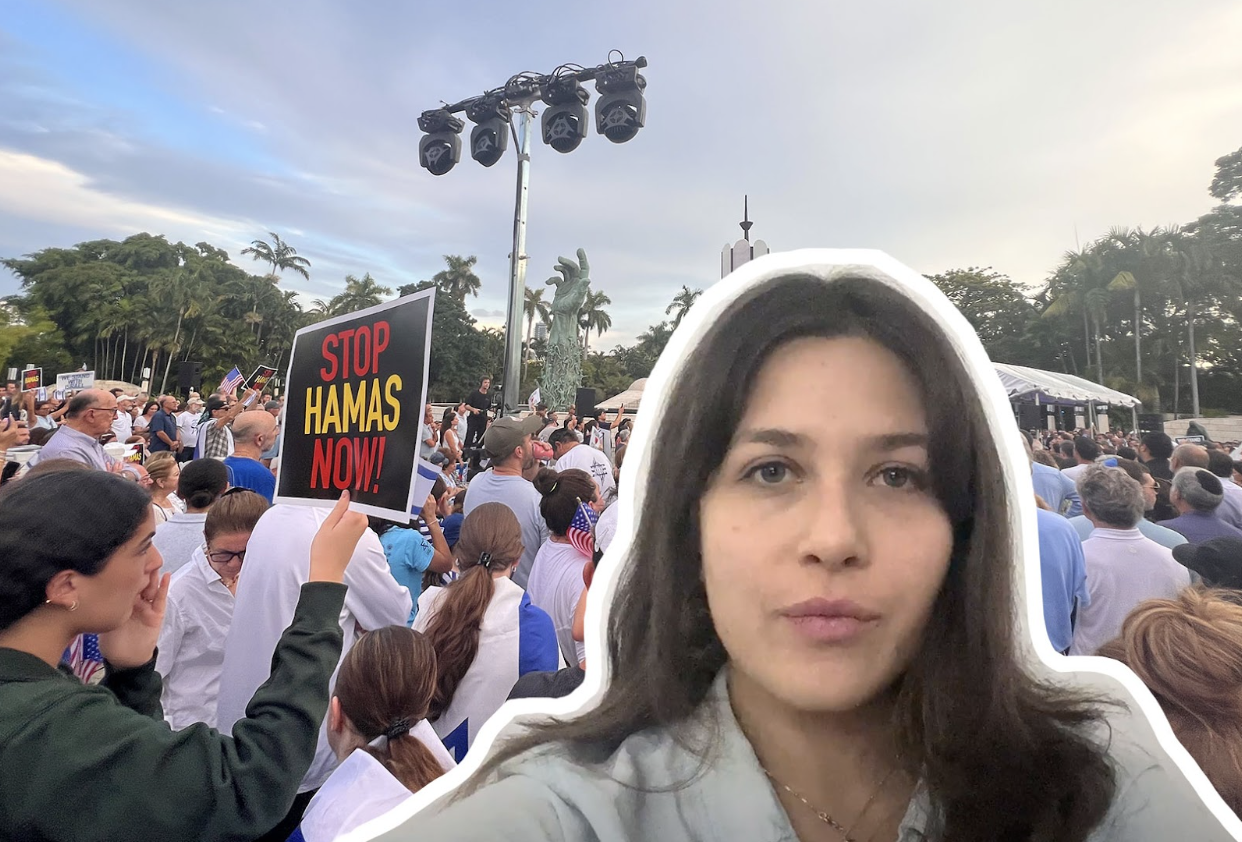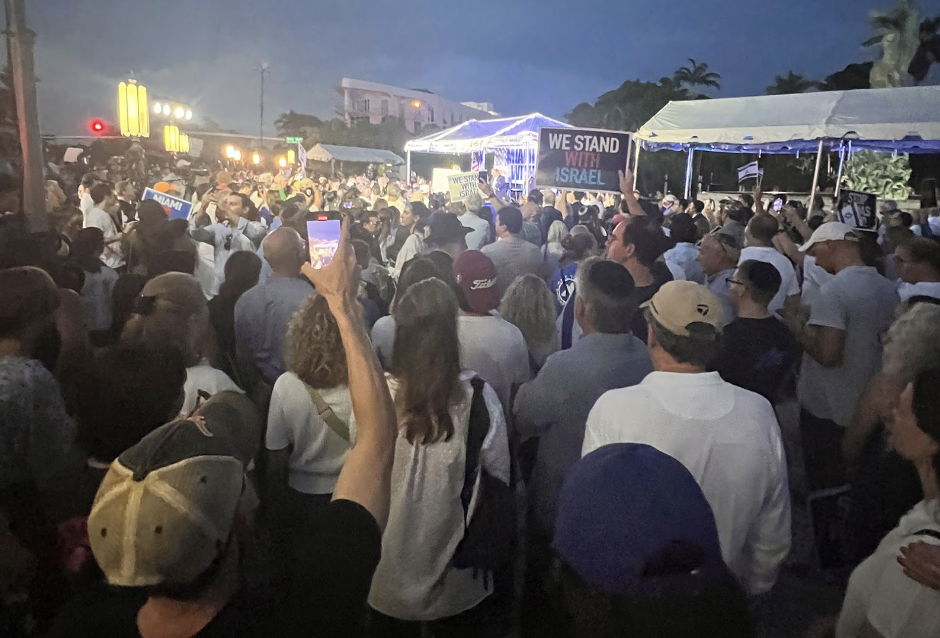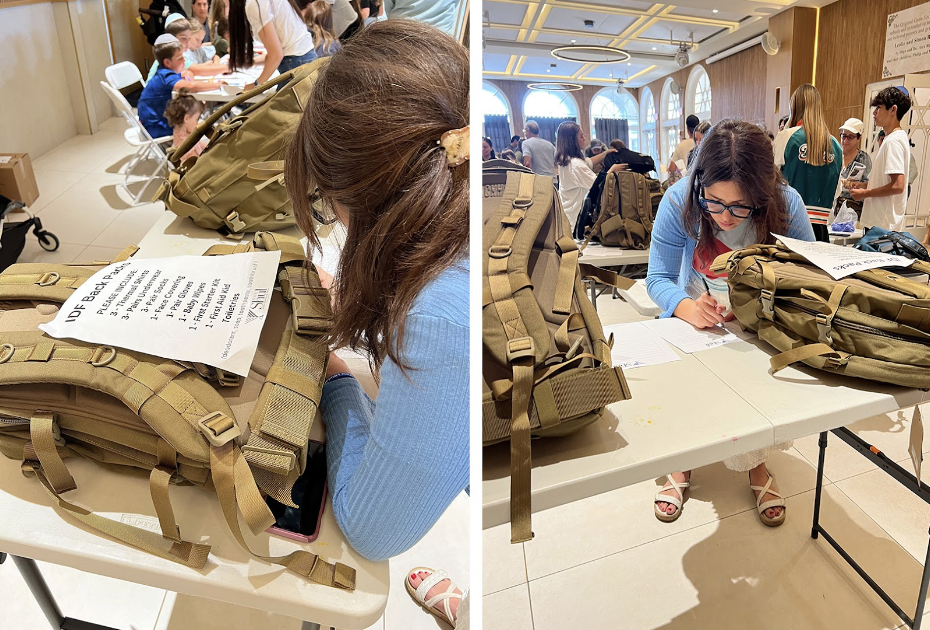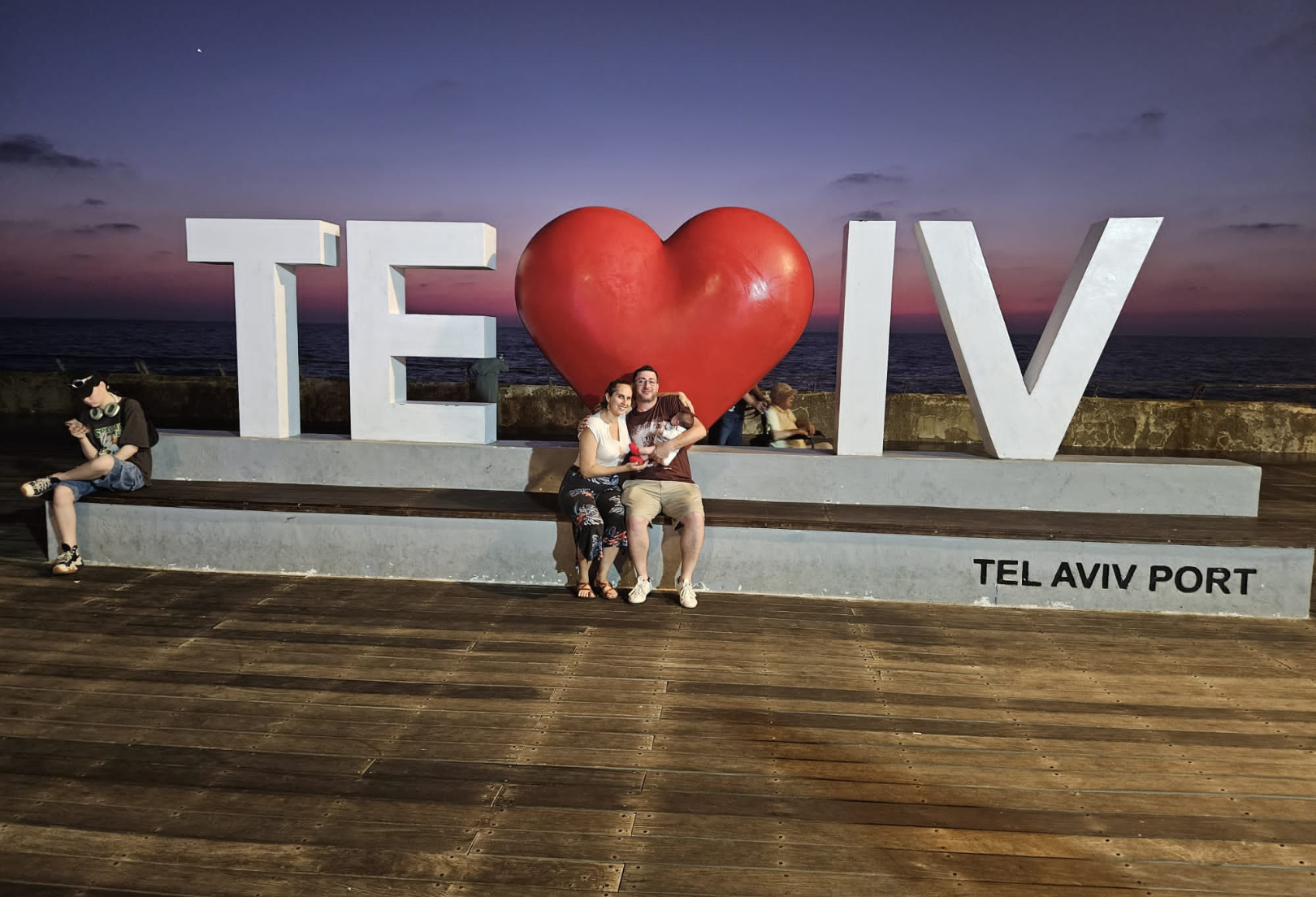
How I Lived During the First Week of War: Stateside
I visited Israel for the first time in 2016 on a Taglit-Birthright Israel trip, and I finally saw the Jewish nation that is our ancestral homeland. In 2018, I returned again as a staffer to help lead a Taglit-Birthright Israel trip. In the last year, I have visited Israel twice—for Rosh Hashanah and Shavuot—and there is no place in the world where I feel so alive and at home.
I write this piece to highlight my attempt to rise above the hatred by involving myself in community events and putting my love and commitment into practice for all Jews. I strongly believe that what antisemites hate about Jews is our ability to hold both heartbreak and joy at the same time. I believe that they hate our determination to fulfill our potential and pursue the highest good. What that means is: we need to continue to hold both heartbreak and joy and to pursue the highest good—that is how we win, every time.
I grew up in a pro-Israel household; my parents and grandparents were always in awe of Israel and its vitality as the only democracy in the Middle East. Leading in technology and innovation, the start-up nation is a pillar of hope and strength. My late grandfather Simcha, of blessed memory, staunchly supported the Jewish state, as he had to flee Poland at the age of five, shortly before the Holocaust. Other than his immediate family, all of his relatives were murdered during the Holocaust.
It was weeks ago now that Hamas broke into Israel through Gaza, killing innocent civilians, including babies, women, disabled persons, and the elderly. This is a dark hour for all the people of Israel, and Jews worldwide feel threatened on a personal level.
There are few of us; we make up, but 0.2% of the world’s population, yet the existence of our land and our bodies seem to require continuous justification. There are geopolitical conflicts and territorial disputes spanned across the globe, but what the international community obsesses over is the land of Israel’s existence. Constantly calling into question its legitimacy and right to defend itself, the international community has shown its true colors.
Hamas is the most recent enemy that has risen against Israel; enemies have risen against Israel in every generation—even before the establishment of the official state in 1948.
Unlike other minority groups, we do not garner sympathy or support in a way that is fashionable or expected. For years, there was the phrase that “anti-zionism is not anti-semitism.” People tried to disentangle the Jewish people from the land that is both our biblical inheritance, a refugee site, and a legally established nation after the Holocaust in which 6 million Jews were killed. They make claims that Israel is the colonizer, an extension of Western interests, when in actuality, it was the West—the Roman Empire—that colonized Israel, Judea at the time, as early as 63 BCE.
There is too much to say, and I can cover only a tiny fraction of all of my thoughts and feelings.
While Hamas waged war on Israel and the people of Israel—whether in the land or in the diaspora—they have also united us more than ever. While the recent terror massacre happened in Israel, and the gruesome scenes were on the ground, my community and I deeply feel the pain and horror of the nation of Israel. The thing about the nation of Israel is that we are one giant beating heart, as encapsulated in the phrase am echad b’lev echad,(עם אחד לב אחד) “one people one heart.” The terrorists succeeded in bloodshed and horror, but their actions united a people spread across the Earth.
It’s funny how grief is met with hope, and how that is how we have always lived as Jewish people. Throughout our exiles and persecution, we have danced and sung, and continued to get married and procreate—we are proof of survival, and we are invincible. In the last week, one of my friends gave birth, another got married, and another celebrated her bridal shower. These simchas do not mean that the war isn’t still happening, but rather that the heart can hold both grief and joy.
The first week of the war, I felt paralyzed and despondent. I hardly moved, my appetite was irregular, and my mind was consumed with violent images of my brothers and sisters in Israel, brokenhearted and afraid. In their pain, though, is a remarkable light, one that is evident when visiting Israel. Life does not stop when tragedy occurs. There is a season for war and for peace, as we recently remembered over Sukkot, and what is needed now is action.
Action is demanded of us. What the enemy wants is for us to feel defeated and afraid. What our Israeli Defense Forces need is our unwavering support and spiritual strength. They have to personally encounter scenes that no one should ever have to see, so what can I do from thousands of miles away? I am blessed and grateful to live in Miami, where there is a large Jewish population that has long been pro-Israel. There are more synagogues and Jewish organizations than I can count, and they all immediately sprung up to develop programming during this challenging time.
The videos of soldiers singing and dancing together, even when they recently lost their friends, family, and comrades. My friends in Israel printed coloring book pages, delivered meals, made sandwiches for soldiers, drove supplies across the country, and started foundations. What brought me strength was thinking about the people in Israel.
On Monday, I went to a shul event in solidarity with Israel. The former town mayor spoke about how Jewish alliances with the government are essential and not political.
For much of our history, we did not have the support or protection of public officials. We do now, here in Miami. The rabbi at the shul emphasized that Hamas is waging psychological and spiritual warfare as they livestream terrors committed against Israelis. Such images should be rejected, and we should guard our eyes from bloody realities on the ground. Images are seared in our minds, and now, more than ever, we should strive to have good thoughts as much as possible.
On Tuesday, I attended the Greater Miami Jewish Federation’s solidarity rally for Israel, where community leaders and public officials spoke. The event took place at the Holocaust Memorial on South Beach, minutes away from where I attended high school. The whole community came together, from the most secular to the most religious, from all corners of the world. People held up signs. One man held up a poster of his childhood friend who was killed by Hamas. At the end of the rally, we sang hevenu shalom aleichem, “we brought peace upon you,” and danced around.

On Wednesday, I attended my weekly pottery class. My teacher grew up in Israel. Her brother had been traveling across South America after finishing the army, and his next stop was Miami. As soon as he heard the news, he returned to Israel from South America, departing on the Saturday the war broke out. My teacher showed me photos of him on the army base, and he genuinely looked like he was okay and in high spirits.
On Thursday, I attended a challah bake in the neighborhood. My friend and her husband live in Jerusalem, and they miraculously got on a flight to Miami a few days after the war broke out. Her sister was supposed to start college in Israel, which, of course was postponed. Despite the chaotic travel, changing of plans, and displacement, the family hosted a challah bake for women that included making delicious bread, singing, dancing, and learning beautiful teachings.
It gave me a lot of strength, especially to be with my friends whose blood brothers and sisters are in the Israeli army right now. I affirmed that if they can jump up and down and sing, as they pray for their siblings’ speedy return, so can I! The bread was delicious, and we filled it generously with za’atar.
Shabbat came on Friday, as it does every Friday, and my family welcomed everyone with shalom aleichem, welcoming the angels on Shabbat, as we do each week.
My mother described how grateful she was to sit together.
She described a photograph she saw—in Israel, two soldiers in the home of a family who was massacred, and their Shabbat table was set up. “For them, it was the last time they lit candles,” my mother said, and I had chills.
At the table, we discussed our love for our family, the Jewish people, and Israel. Our hearts were heavy as we accepted that the war in Israel has less to do with the actual land of Israel, and everything to do with the people of Israel. It’s not the land they hate; it’s us. So what do we do?
Our conclusion was to stay vigilant but not be afraid. That night, I went to bed with my mind racing, and I felt connected to my ancestors, who also felt the impending fear that anti-semitism evokes. I fell asleep when I accepted that I would rather live a Jewish life, and G-d forbid, have something happen to me as a proud Jew than hide in fear and allow the enemy to win.
On Saturday morning, I went to shul, and the room was pulsing with emotion. People were friendly and loving and strong in ahavat Israel—love for all fellow Jews. The rebbetzin, whose grandson is in the IDF and whose granddaughter is in seminary in Tzfat, shared words about how mitzvot and strength are our armor right now. With our positive actions and words, we can help win the spiritual war.
That evening, I joined the community in singing and chanting, and it felt good to let go, sit shoulder to shoulder with my friends, and sing the songs that our ancestors have sung for generations. The room buzzed, and it felt so much better to be among the community than to be alone. I would encourage anyone to identify either virtual or in-person events that help spark inspiration—there are many available.
On Sunday morning, we packed bags for soldiers. Hundreds of bags containing thermals, underwear, flashlights, first aid kits, toothbrushes, and more made their way to Israel in army-green durable backpacks. We wrote letters to soldiers expressing our gratitude and how much their devotion and perseverance invigorated us. It felt great to do something hands-on and tangible that would materially help the soldiers on the ground.
Afterward, my family and I went to the best kosher restaurant in Miami, Zak the Baker. There, I ran into a couple of friends, and we shared our feelings of simultaneous heartbreak and deep love for each other.

My activities continued into the evening—more time spent connecting with my friends, family, and community—because we are so much stronger together.
I share my experiences because I am so upset about the terror of Hamas and the international community’s reluctance to stand with Israel. But rather than ruminate in the vitriol of enemies, I’d rather be with the people that I love—and choose life together.
With great confidence, I believe we will come out of this war better, lighter, and more loving than ever. We will tell our children and grandchildren about the dark cloud that hung over us at this point in our lives, in 2023, and they will remember it the same way we remember our grandparents’ stories
Am yisrael chai.
Wed 20 Dec 2023
Current Events: Israeli Story
Community
Mon 18 Dec 2023
Alumni Spotlight: Frank Horowitz
Community
Mon 18 Dec 2023
Alumni Spotlight: Jordan Mayer
Community
Fri 8 Dec 2023
Alumni Spotlight: Adam Elbaz
Community
Tue 7 Nov 2023
One Country; One People; We Are Israel
Community
Tue 7 Nov 2023
Alumni Spotlight: Jonathan Swill
Community
Thu 5 Oct 2023
Alumni Spotlight: Brooke Baevsky
Community
Mon 18 Dec 2023
Alumni Spotlight: Jordan Mayer
Community
Fri 8 Dec 2023
Alumni Spotlight: Adam Elbaz
Community
Tue 7 Nov 2023
One Country; One People; We Are Israel
Community
Tue 7 Nov 2023
Alumni Spotlight: Jonathan Swill
Community
Thu 5 Oct 2023
Alumni Spotlight: Brooke Baevsky
Community



